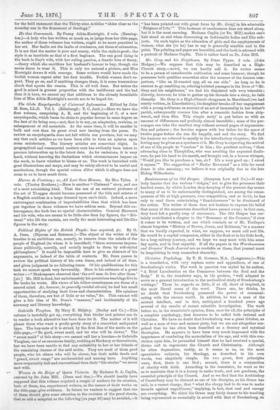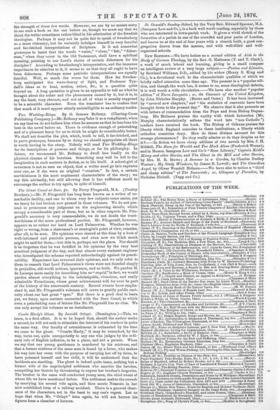Christian Psychology. By T. M. Gorman, M.A. (Longmans.)—This is a
translation, with very copious notes and appendices, of one of Swedenborg's works. The work in question was styled by its author, "A Brief Lucubration on the Commerce between the Soul and the Body." It is, the translator says, in his preface, "well adapted to serve as a general introduction to the methodical study of Swedenborg's writings." These he regards as little, if at all, short of inspired, in the most literal sense of the word. There can, he thinks, be no doubt that Swedenborg possessed the power of communi- cating with the unseen world. In addition, he was a man of the acutest intellect, and in fact, anticipated a hundred years ago several of the results of recent scientific investigation. The work before us, in the translator's opinion, fixes, once for all, the principles of a complete psychology, that deserves to bo called both rational and Christian. We have no doubt that Swedenborg was a great thinker, as well as a man of true and earnest piety, but we are not altogether sur- prised that he has often been described as a dreamy and mystical theologian. He appears to have been very much impressed with the importance of combating the materialism of his ago, and with this con- viction upon him, be persuaded himself that he had received a special, divine call to regenerate the Church and Christianity. Although he often dogmatises, rashly, as it seems to us, on the most speculative subjects, his theology, as described in his own words, was singularly simple. Its two great, first principles were, first, there is one God ; second, there is a conjunction of charity with faith. According to the translator, he went so far as to maintain that it is a heresy to make truth, and not goodness, the essential principle of the Church. And so we Slid that the Archbishop of Canterbury may bo claimed as one of his disciples, as his Grace has said, in a recent charge, that " what the clergy had to do was to make inroads against ungodliness," implying, in fact, that zeal and energy are everything. We think his Grace may fairly demur to his teaching being represented as essentially in accord with that of Swedenborg, on
the strength of these few words. However, we are by no means sorry to see such a book as the one before us, though we must say that we think the writer sometimes rather blind in his admiration of the Swedish theologian. Perhaps it may not be quite fair to speak of Swedenborg as a mere visionary, but he certainly indulges himself in very fanciful and far-fetched interpretations of Scripture. Is it not somewhat grotesque to insist that the words " water," "river," " fish," "fisher- man," when they occur in the Old Testament, shall have a spiritual meaning, pointing to our Lord's choice of certain fishermen for his disciples ? According to Swedenborg's interpretation, and the immense importance he attaches to it, it seems to us that they all ought to have been fishermen. Perhaps some patristic interpretations are equally fanciful. Well, so much the worse for them. How far Sweden- borg anticipated the wave-theory of light, and Professor Tyn- dall's ideas as to heat, motion, a3ther, &c., is a question quite beyond us. A long quotation is given in an appendix to tell us what he thought about the a3ther and the phenomena caused by it, but it is, to say the least, very obscure, and not at all of what is usually supposed to be a scientific character. Even the translator has to confess that that much of it must appear utterly unintelligible to an ordinary reader.

































 Previous page
Previous page